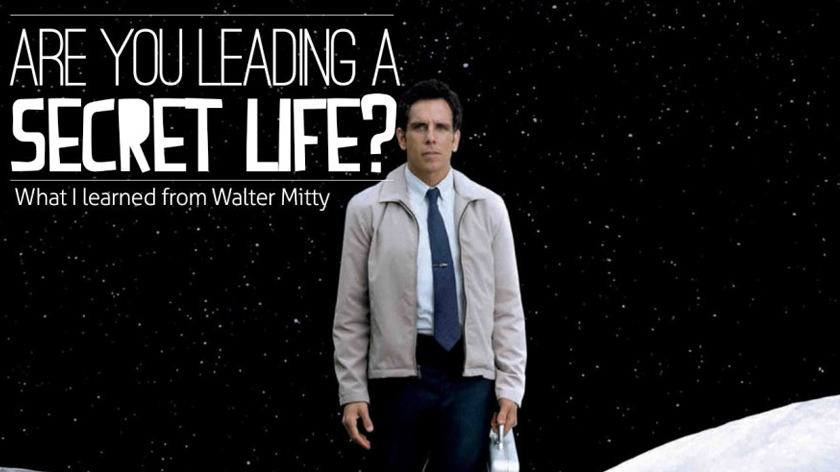Are you leading a secret life? (what I learned from Walter Mitty)
When I was a kid I had lots of heroes. There was my Dad who could out stare anyone, my oldest brother who could do anything, and of course Clint Eastwood who could out shoot everyone. It’s taken me a very long time to get on that list.If you haven’t seen Ben Stiller’s remake of The secret life of Walter Mitty, you should. It was all about me.Based on the classic novel by Paul Thurber, Stiller used the now defunct Life magazine as the backdrop for day dreamer Mitty to slip into his adventure fantasies. In the first third of the film we see Mitty enter a fanciful version of himself whenever life gets threatening or stressful. Rather than bumbling, halting, and insecure, he is leaping through windows to rescue a cat, climbing a mountain to rescue the girl, or bravely facing down his insensitive new boss.His escapism is so frequent and normal to him he’s unaware he’s leaving reality.
I used to do that.
In tough times I had a little Mitty in me. It was easier to imagine the hero in me rescuing my business or dealing with the rude customer, then doing it myself. My alter-ego was always willing to swing in from a tree branch and rescue me.The bummer was it never happened - real life was slower, more black and white. And it required more work. Ultimately, the results were up to me. I either did it, or I didn’t—no fantasy solutions.It’s not that we don’t need our day-dreaming escapes. We do. The trick is to find a balance between dreaming about what could be and the step-by-step process of getting things done.
Do you ever do a Walter Mitty?
Maybe you’ve had fantasies like these:
- you image the rude person in the office taking a ‘nice’ pill and leaving you alone.
- tomorrow will be different—the tasks you’ve been putting off will be done
- the book you’re writing will leap to New York Times best seller list
- your new on-line course will be insanely popular and sell itself
- your latest blog post is Pulitzer material and finally you’ll be discovered
Whoa, Walter. Snap back to reality mister. Sure, miracles happen, but usually on the big screen. Making stuff happen in life is a little different.
The best of fantasy and real life
The brain can’t tell what is real. We know that. Watch a freaky horror movie and adrenalin pumps  through your veins, pupils dilate, and you’ll be gripping the theatre armrests in no time. That's good news.Just as you can imagine the worst (I’m not a big fan of being chased by a chainsaw), you can imagine the best. The brain is happy to participate.When I create a goal, I want (and need) to imagine it happening. I DO want my book to be a best-seller. I DO want my keynote to bring the audience to their feet. And I DO want to be honest with people who have disappointed me (and who I love). Imagining the best results prepares me, both consciously and subconsciously, to make it happen. “Whatever the mind can conceive, and believe,” Napoleon Hill wrote some 80 years ago, “the mind can achieve.”
through your veins, pupils dilate, and you’ll be gripping the theatre armrests in no time. That's good news.Just as you can imagine the worst (I’m not a big fan of being chased by a chainsaw), you can imagine the best. The brain is happy to participate.When I create a goal, I want (and need) to imagine it happening. I DO want my book to be a best-seller. I DO want my keynote to bring the audience to their feet. And I DO want to be honest with people who have disappointed me (and who I love). Imagining the best results prepares me, both consciously and subconsciously, to make it happen. “Whatever the mind can conceive, and believe,” Napoleon Hill wrote some 80 years ago, “the mind can achieve.”
And then there is the work
Once my mind is aligned and laser-focussed, it’s time to make the list and start stepping forward. This is when the “rubber meets the road”, as my Dad used to say. The good news is (as the proverb goes) “nothing succeeds like success.” In other words, when you make the phone call, put in 30 minutes of quality work (as Neil Fiore calls it in The Now Habit), or organize the planning meeting, you fuel more success. Just like an engine flywheel, once you get started you create momentum that is hard to stop. [Tweet this out] That’s how you create real results.Are you ready to create real results and a rich life? Let’s get started. “…there’s a difference between knowing the path and walking the path.” Morpheus
Small Wins - Why Little Steps are the Path to Big Rewards
Keynotes and workshops by Hugh Culver


